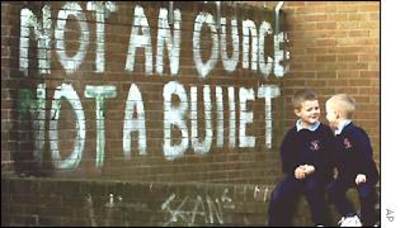Today in the New York Times, David Brooks argues the new conservative narrative that Americans are no longer concerned about the Iraq War. In doing so, he makes this rather amazing assertion:
Republicans don’t want to talk about Iraq because they’re humiliated by
the conduct of the war, and Democrats don’t want to talk about it
because they were wrong about the surge.
This is a contemptible lie. Democrats were not, and are not, wrong about the surge. As has been stated ad nauseum here at Democracy Arsenal and elsewhere, the surge was predicated on giving Iraqis breathing room for political reconciliation. This has not happened. To argue that the surge is a success is the new GOP line on Iraq, but it's a bald-faced lie and should be exposed as such.
As for the notion that the American people aren't interested in Iraq, here's what Brooks has to say:
Before the 2004 election, half of all voters listed terrorism as their
top concern. But, according to a Wall Street Journal/NBC poll, roughly
a third do today.
Like any good Bushie, Brooks is trying to conflate the "war on terror" with the war in Iraq, but, as most Americans now understand, these are two separate issues. Indeed it should hardly seem surprising that most Americans would no longer list terrorism as their main concern - they are more worried about Iraq. But David, you get an A for effort.
While the numbers have declined somewhat, every major recent poll continues to indicate that Iraq remains the number one concern of voters. And in the most recent CBS News poll the American people believe by a 45-30 margin that Democrats will do a better job on Iraq.
I'm sure David Brooks would love for this election to be a "post-war election" as he puts it, but as long as upwards of 150,000 troops remain in Iraq it seems very difficult to imagine a scenario where the war is not front and center for Election '08. Moreover, with all the major Republican candidates refusing to break with the President on Iraq there seems even more reason for Dems to make Iraq a key campaign focus. But again David, you get an A for effort.
UPDATE: And in further evidence of exactly how wrong David Brooks post-war argument is, check out the latest Gallup poll on Iraq:
When asked which issues will be most important in
determining their vote for president in next year's election, Americans
by a wide margin say the war in Iraq, with more than one in three
mentioning the war.
While Gallup makes the point that the number of people citing Iraq as their number one concern has dropped from 42% to 36% Iraq is still far and away the most important concern: more than double that of the nearest issues; the economy
(16%), healthcare (15%), and illegal immigration (10%).



